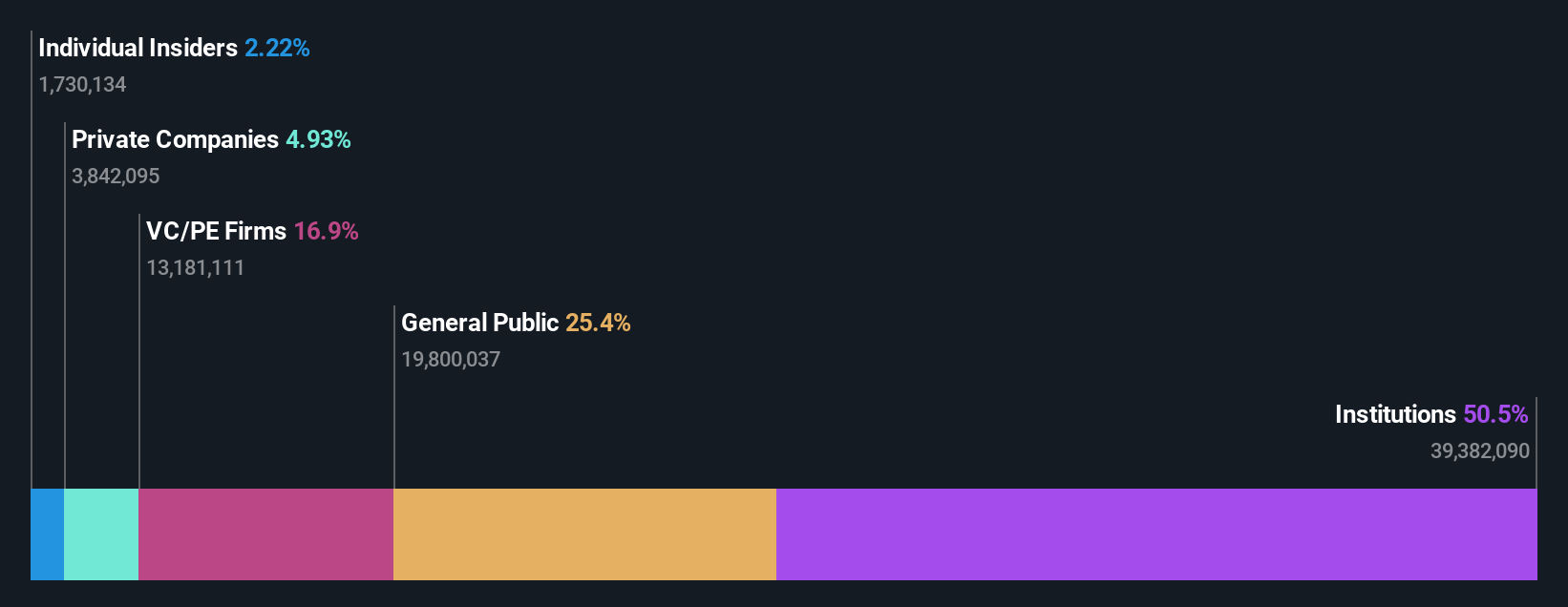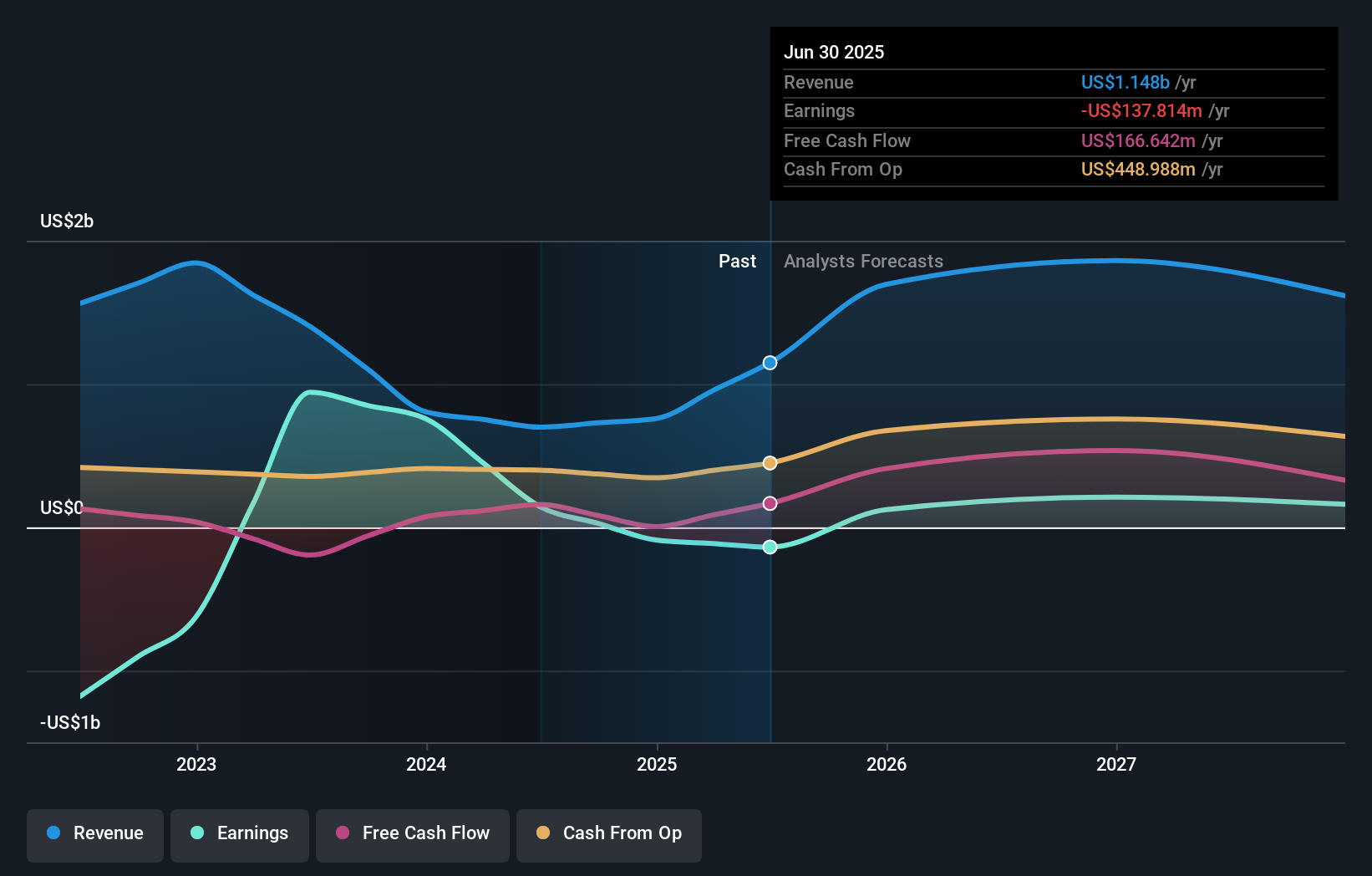- United Kingdom
- /
- Oil and Gas
- /
- LSE:DEC
Institutional investors have a lot riding on Diversified Energy Company PLC (LON:DEC) with 51% ownership
Key Insights
- Significantly high institutional ownership implies Diversified Energy's stock price is sensitive to their trading actions
- The top 13 shareholders own 51% of the company
- Using data from analyst forecasts alongside ownership research, one can better assess the future performance of a company
To get a sense of who is truly in control of Diversified Energy Company PLC (LON:DEC), it is important to understand the ownership structure of the business. And the group that holds the biggest piece of the pie are institutions with 51% ownership. In other words, the group stands to gain the most (or lose the most) from their investment into the company.
And things are looking up for institutional investors after the company gained UK£47m in market cap last week. The gains from last week would have further boosted the one-year return to shareholders which currently stand at 47%.
In the chart below, we zoom in on the different ownership groups of Diversified Energy.
Check out our latest analysis for Diversified Energy

What Does The Institutional Ownership Tell Us About Diversified Energy?
Many institutions measure their performance against an index that approximates the local market. So they usually pay more attention to companies that are included in major indices.
We can see that Diversified Energy does have institutional investors; and they hold a good portion of the company's stock. This implies the analysts working for those institutions have looked at the stock and they like it. But just like anyone else, they could be wrong. It is not uncommon to see a big share price drop if two large institutional investors try to sell out of a stock at the same time. So it is worth checking the past earnings trajectory of Diversified Energy, (below). Of course, keep in mind that there are other factors to consider, too.

Institutional investors own over 50% of the company, so together than can probably strongly influence board decisions. Hedge funds don't have many shares in Diversified Energy. Looking at our data, we can see that the largest shareholder is EIG Global Energy Partners with 11% of shares outstanding. Meanwhile, the second and third largest shareholders, hold 6.2% and 5.3%, of the shares outstanding, respectively. Furthermore, CEO Robert Hutson is the owner of 1.6% of the company's shares.
Looking at the shareholder registry, we can see that 51% of the ownership is controlled by the top 13 shareholders, meaning that no single shareholder has a majority interest in the ownership.
Researching institutional ownership is a good way to gauge and filter a stock's expected performance. The same can be achieved by studying analyst sentiments. Quite a few analysts cover the stock, so you could look into forecast growth quite easily.
Insider Ownership Of Diversified Energy
The definition of an insider can differ slightly between different countries, but members of the board of directors always count. The company management answer to the board and the latter should represent the interests of shareholders. Notably, sometimes top-level managers are on the board themselves.
Insider ownership is positive when it signals leadership are thinking like the true owners of the company. However, high insider ownership can also give immense power to a small group within the company. This can be negative in some circumstances.
We can see that insiders own shares in Diversified Energy Company PLC. It is a pretty big company, so it is generally a positive to see some potentially meaningful alignment. In this case, they own around UK£20m worth of shares (at current prices). If you would like to explore the question of insider alignment, you can click here to see if insiders have been buying or selling.
General Public Ownership
The general public, who are usually individual investors, hold a 25% stake in Diversified Energy. This size of ownership, while considerable, may not be enough to change company policy if the decision is not in sync with other large shareholders.
Private Equity Ownership
With a stake of 17%, private equity firms could influence the Diversified Energy board. Some investors might be encouraged by this, since private equity are sometimes able to encourage strategies that help the market see the value in the company. Alternatively, those holders might be exiting the investment after taking it public.
Private Company Ownership
Our data indicates that Private Companies hold 4.9%, of the company's shares. Private companies may be related parties. Sometimes insiders have an interest in a public company through a holding in a private company, rather than in their own capacity as an individual. While it's hard to draw any broad stroke conclusions, it is worth noting as an area for further research.
Next Steps:
It's always worth thinking about the different groups who own shares in a company. But to understand Diversified Energy better, we need to consider many other factors. Be aware that Diversified Energy is showing 3 warning signs in our investment analysis , and 2 of those are concerning...
If you would prefer discover what analysts are predicting in terms of future growth, do not miss this free report on analyst forecasts.
NB: Figures in this article are calculated using data from the last twelve months, which refer to the 12-month period ending on the last date of the month the financial statement is dated. This may not be consistent with full year annual report figures.
New: Manage All Your Stock Portfolios in One Place
We've created the ultimate portfolio companion for stock investors, and it's free.
• Connect an unlimited number of Portfolios and see your total in one currency
• Be alerted to new Warning Signs or Risks via email or mobile
• Track the Fair Value of your stocks
Have feedback on this article? Concerned about the content? Get in touch with us directly. Alternatively, email editorial-team (at) simplywallst.com.
This article by Simply Wall St is general in nature. We provide commentary based on historical data and analyst forecasts only using an unbiased methodology and our articles are not intended to be financial advice. It does not constitute a recommendation to buy or sell any stock, and does not take account of your objectives, or your financial situation. We aim to bring you long-term focused analysis driven by fundamental data. Note that our analysis may not factor in the latest price-sensitive company announcements or qualitative material. Simply Wall St has no position in any stocks mentioned.
About LSE:DEC
Diversified Energy
Operates as an independent owner and operator of producing natural gas and oil wells primarily in the Appalachian Basin of the United States.
Undervalued with reasonable growth potential.
Similar Companies
Market Insights
Community Narratives




